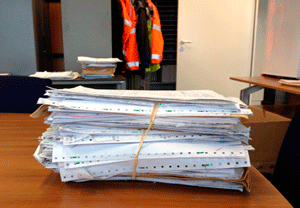Paperless air freight takes to the sky

Global freight and logistics company Panalpina claims to be the first to achieve completely paperless flights for general air freight. Using its own 747-8 freighter planes, the freight forwarder now operates several paperless (e-freight) port-to-port services with final destination in Europe, Hong Kong and the U.S.
At 05:49 local time on November 19, 2013, flight 5Y607 departed from Huntsville airport in Alabama, U.S. What appeared to be just another routine Panalpina flight to Luxembourg was in fact the inaugural flight of the world’s first paperless round-trip route for general air freight.
More than 7,800 tons of paperwork travels through the sky every year, adding time, cost and environmental waste to air freight – not to mention space. The quest to cut this superfluous load started in 2006 when the industry-wide e-freight initiative led by IATA began. The aim is to eliminate dependency on paper air waybills (written contracts for transportation) and document pouches (contain original documents from the shipper, such as invoices and packing lists) and to replace them with standardized electronic messages.
Panalpina is confident that it can fly all general air freight on its own controlled Boeing 747-8 Freighters without paper in less than two months’ time, the only exceptions being flights to and from the MEAC region (Middle East, Africa, CIS), Mainland China and Brazil. By 2015 the company aims to eradicate 80% of pouches for all general air cargo, be it on the own controlled network or on commercial flights.
The average air freight shipment generates 30 documents that have to be handled by each of the partners involved in the shipment. Replacing this paperwork with electronic transmissions in the fragmented world of air freight is no small feat. It requires resources, training, IT investments, standard operating procedures and a willing partnership between carriers, ground handling agents and freight forwarders.
“The benefits of going digital are clear: more efficiency, less cost, reduced environmental impact and increased data quality – but it isn’t easy,” says Lucas Kuehner, global head of Air Freight at Panalpina. “Air freight is complex, fragmented and lacks standardization – but we are overcoming these challenges together with our partners. Being active in the industry is a key to our success. Our e-freight ambassadors are out there building connections and we train our staff to help make e-freight a reality.”
